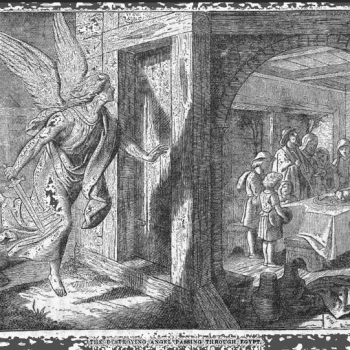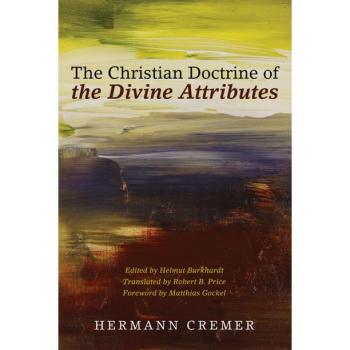“God’s Will” In Calvinism and Arminianism
Calvinists and Arminians agree that God “accomplishes all things according to his counsel and will” because so says Ephesians 1:11 and the entire testimony of Scripture. Both, however, interpret this differently.
John Calvin, facing this verse (and his overall belief in divine determinism) and the manifest reality of evil posited that even the evil deeds of men are willed by God. (See Institutes of the Christian Religion, Book I, Ch. XVIII “God So Uses the Works of the Ungodly, And So Bends Their Minds to Carry Out His Judgments, That He Remains Pure from Every Stain.”) According to Calvin “Men can accomplish nothing except by God’s secret command, that they cannot by deliberating accomplish anything except what he has already decreed within himself, and determines by his secret direction….” Throughout this discussion of God’s will and human evil Calvin adamantly denies God’s “bare permission” of anything. Whatever happens, he clearly avers, is always and without exception willed and decreed by God. Speaking of evildoers Calvin asserts that “they have been impelled by God’s sure determination” to do what they do—including evil. Even Satan only does what God wants him to do: “It is often by means of Satan’s intervention that God acts in the wicked, but in such a way that Satan performs his part by God’s impulsion and advances as far as he is allowed.” Finally, Calvin sums up his view of God’s providence in relation to evil: “To sum up, since God’s will is said to be the cause of all things, I have made his providence the determinative principle for all human plans and works, not only in order to display its force in the elect, who are ruled by the Holy Spirit, but also to compel the reprobate to obedience.” Compel the reprobate to obedience…to God’s determinative will.
Those familiar with this section of Calvin’s Institutes will know (so I have to say) that Calvin then launches into a lengthy and convoluted discussion of distinctions that must be made in “God’s will.” He admits that much that humans do is against God’s will. So he posits a distinction between God’s will and God’s precept. He asserts that “Man does [in sinning] by God’s just impulsion what he ought not to do.” Let’s be clear here. According to Calvin when a person sins he sins by God’s “just impulsion,” not permission. And yet, he is guilty because he goes against God’s will. How can this be? Only in the sense that guilt accrues from breaking God’s precepts (commands), what some modern Calvinists call God’s “prescriptive will,” even though his doing so is compelled by God according to God’s decree (“decretive will”). One finds this same distinction between two wills of God in most contemporary Calvinist theologians (except revisionist Reformed theologians who don’t really deserve the label “Calvinist”). The two wills are: God’s decretive will by which he designs, ordains and renders certain everything that happens without exception and even “compels” the reprobate to obedience to his will, and God’s prescriptive will by which he commands people not to sin. Only this device, so Calvinists say, explains Ephesians 1:11. God secretly works even disobedience, evil, in sinners, compelling them to it by means of “secret impulses” implanted in them and yet they violate his will, his prescriptive will, when they sin. According to Calvin (and most modern conservative Calvinists) a single human act can be both according to God’s will and against God’s will—once this distinction is observed.
Now Calvin (and most modern Calvinists) think this distinction does three things. First, it preserves God’s absolute sovereignty and providence. Second, it explains why sinners are guilty while God is not (even though their sins are decreed and compelled by God). Third, it preserves God from being the author of sin.
Arminians (but also Eastern Orthodox, many if not most Roman Catholics, Anabaptists and others) think this Calvinist device simply fails to accomplish the second two things it’s supposed to accomplish. It only accomplishes the first. The result is that, as Arminius said, this account of God’s sovereignty and providence in relation to sin: 1) makes God a sinner, 2) makes God the only sinner, and 3) makes sin not sin.
So how do Arminians understand and explain Ephesians 1:11? With a different distinction between two wills of God or, better stated, two modes of God’s one will. First, there is God’s antecedent will—what God ideally wished for and wants and works toward. 2 Peter 3:9: God is not willing that any should perish. 1 Timothy 2:4: God wants all people to be saved. God’s consequent will, however, is what God reluctantly permits and not with “willing permission” by which Calvin clearly meant “effectual permission.” Jesus cried over Jerusalem who stoned the prophets and rejected him as its messiah. Why—if everything that happens is according to God’s decretive will? Here some modern Calvinists make another distinction in God’s will—what God decrees (e.g., Jerusalem’s rejection of Jesus) and what God wishes could be the case (Jerusalem’s embrace of his messiahship). According to John Piper, for example, God has a rich and complex emotional life and grieves over that which he designs, ordains and governs (and renders certain) because sometimes he wishes it could be otherwise even though by his own wisdom and will it cannot be otherwise (for his greater glory). According to this device, then, Jesus was crying over what he himself, as God, decreed and compelled for God’s glory. The problem with this, of course, is that it conflicts with Ephesians 1:11 because it says God does not work all things according to his will (that which he really wishes could be the case).
My point here is simply that everyone, Calvinists and Arminians alike, interprets Ephesians 1:11 by positing distinct wills of God.
Arminians whole heartedly agree with Ephesians 1:11! Everything that happens without exception is accomplished by God according to his counsel and will. But some specific things are accomplished by God according to his antecedent will and some specific things, especially sins, are accomplished by God according consequent will. How are sins “accomplished by God” according to his consequent will? No creature is totally autonomous of God; no creature can act without God’s permission and even aid. I cannot lift my arm without God’s agreement and help however reluctant those may be. No creature can act totally apart from God because God is the all-sustaining power of life itself. “In him we live and move and have our being.” Consequent to man’s decision to rebel and fall away from God’s antecedent will God reluctantly permits sin and enables it. (Remember, without God’s enablement no creature could do anything and would cease to act at all.)
Also, according to Arminian theology, Ephesians 1:11 means, according to Arminian theology, that “all things” refers especially to God’s redemptive plan and purpose for his people. The context makes that clear. All good is accomplished by God and God will carry to completion the plan to redeem and restore creation in spite of human sin and evil and in response to it—somehow (in a way we cannot see or understand) incorporating it into his unfolding work in and for the world.
To be sure, both the Calvinist interpretation and the Arminian interpretation have difficulties when it comes to explaining a seemingly simple verse of Scripture. Both stretch people to think beyond the bare words themselves. But that’s what exegesis and hermeneutics and theology is all about. Unless someone stops with quoting Ephesians 1:11, interpretation appears. Whenever someone attempts to explain Ephesians 1:11in the face of manifest sin and evil in the world either something like the Calvinist interpretation or the Arminian interpretation is at least on the horizon and they are moving in that direction.
So it is not enough for mature, reflective Christians simply to toss out Ephesians 1:11 (or any other verse) and say it “proves” their theology. The question is whether their interpretation of of it 1) coheres with the whole testimony of Scripture, and 2) coheres with other beliefs they hold.
Whenever someone simply tosses out Ephesians 1:11 as “proof” of their theology of God’s sovereignty I know what I’m dealing with—an immature, unreflective, simple-minded Christian who does not yet understand that they are interpreting Ephesians 1:11 and that there are other interpretations of it. That doesn’t shock or dismay me when it’s done by ordinary lay people who untutored in theology and biblical hermeneutics. Then I’m like the kindly physician who hears a patient say “But doctor! Everyone knows an apple a day keeps the doctor away which is why I rarely come to you for a physical check up and preventive blood work.” The doctor will assess who is saying this to him and respond accordingly.
This blog is not designed or intended for people steeped in folk religion although they are certainly welcome here. But insofar as they attempt to teach me using unreflective proof texting and imply that I am “obviously wrong” because “my Bible says…” they may expect a terse reply from me that challenges them to grow up and starting thinking more rationally and reflectively about the Bible and theology.















